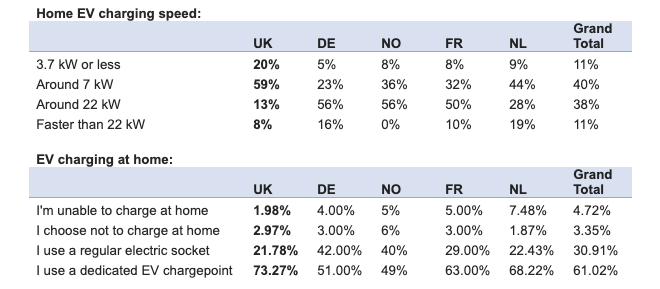When you think of roadblocks to EV adoption, vision-challenged automakers, uneducated dealerships and SUV-loving consumers make for convenient culprits. However, in many parts of the world, arcane technical and political issues also present major challenges.
In the UK, a technical issue having to do with the electrical grid is emerging as a limitation on home charging, especially as EV battery sizes and charging speeds increase. To summarize the issue in layman’s terms, faster charging requires more power, and in much of the UK the residential power supply isn’t designed to deliver the amount of juice required to refill a modern EV in a reasonable time.
The new energy research and consulting company Delta-ee recently released a report that explains why Britain’s predominantly single-phase residential electricity supply puts it at a disadvantage. Compared to other European countries such as France, Germany, the Netherlands and Norway, EV owners in many parts of the UK are limited to slower home charging speeds. For example, nearly 75% of German EV drivers can charge at home at rates of 22 kW or higher, whereas only 20% of British drivers have access to the same power levels.

“Residential electricity supply on the continent lends itself much better to high-power uses such as fast home EV charging than in the UK,” explains Alexander Lewis-Jones, EVs and Electricity Product Manager at Delta-ee. “Our reliance on single-phase supply could hold us back in the future. Twelve-hour overnight charges are one thing, but as the EV transition gathers pace and battery sizes grow – and we potentially pivot to electrified heating too – this may become a cause for regret.”
On the other hand, UK EV owners are more likely to use dedicated EV charging stations, as opposed to ordinary wall outlets, for home charging. Some 73% of respondents to Delta-ee’s survey said they use dedicated EV charging stations, compared to 50% in Germany. “The findings suggest that EV drivers in Britain are diligent about safe and proper charging, and that the OLEV grant [£500 for the purchase and installation of a home charging station] has been a successful policy in encouraging those behaviours and making them affordable,” says Delta-ee.
“This is evidence that the UK Government’s home charge point grant has been a great policy success,” adds Alexander. “Let’s hope this continues when, from July this year, we transition towards giving grants to ‘smart’ home charge points to help accommodate EVs into the energy system. Single-phase supply is a drawback, but this is an opportunity for the UK to lead Europe on advanced home charging solutions.”
Source: Delta-ee
